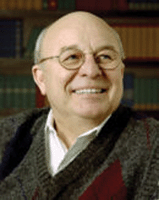Obituaries: C. Edward Oliver
October 21, 2008

C. Edward Oliver, 1943�2008
Ed Oliver lived by his wits and thrived on the human and intellectual challenges posed by our world of mathematics, science, computing, and policy. He loved life and woke up every morning happy to embrace it. He liked to share: food, drink, friendship, ideas, and opportunities. At the same time, he was a very private person, holding certain thoughts and intimacies quite close.
Ed believed in people, community, education, and public service. He understood his public service not just as a job, but rather as the exercise of a trust. His accomplishments, both as an Air Force officer and as a civilian, are evidence of his dedication to that trust and of his determination to give his best efforts for his country.
Carl Edward Oliver was born on February 26, 1943, in Anniston, Alabama. He attended the University of Alabama, where he earned a PhD in mathematics in 1969. He served in the Air Force from 1969 until 1989---as a professor, research program manager, and as the chief scientist of the Air Force Weapons Laboratory. While in the Air Force, Ed also worked on assignment at the Department of Energy, where he helped establish the Scientific Computing Staff---the genesis of today's Office of Advanced Scientific Computing Research.
Later in his career, Ed was appointed associate laboratory director for computing and computational sciences at DOE's Oak Ridge National Laboratory. At ORNL, he was instrumental in establishing the programs and mentoring the people who later blossomed into the Center for Computational Sciences and the Leadership Computing Facility.
In 1998, Ed returned to DOE headquarters, on detail, to lay the groundwork for what we now know as the SciDAC (Scientific Discovery through Advanced Computing) program. This program is now broadly acknowledged as the global leader in advancing applications of computational science. In 2000, Ed went on at DOE to become the Office of Science's associate director for advanced scientific computing research. There, rising to the challenge posed to U.S. high-performance computing leadership by Japan's Earth Simulator, he successfully advocated the creation of a U.S. response---now known as the Leadership Computing Program, which currently sponsors computing facilities at Oak Ridge and Argonne National Labs.
In building programs, Ed never forgot that science is about people. He worked hard to ensure that research programs would grow in parallel with those more focused on hardware---and that individual investigators would have opportunities to thrive in a world increasingly focused on team science. Under his leadership, DOE's applied mathematics research program saw the largest funding increases in its history.
Ed believed in level playing fields, open opportunities, and new blood. He worked to grow our community both by supporting existing vibrant talent and by drawing in new minds. He was a great supporter of a prominent role for DOE in educating the next generation of computational scientists---the growth of the Computational Science Graduate Fellowship Program and creation of the Early Career Principal Investigator Program bear witness to this.
If in reading this you learned of previously unsuspected roles played by Ed, then you have encountered another of his principles. Ed felt that one could either make things happen or take credit for them, but not both. In his own life, he consistently opted for action.
Ed had great plans for the future. Unfortunately, they were cut short by his untimely death, from rare complications of major surgery. He died in our nation's capital on July 22, 2008.---Gary M. Johnson, Fort Collins, Colorado.

